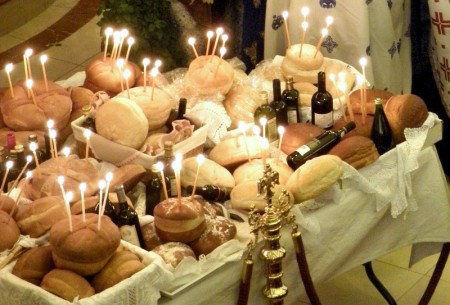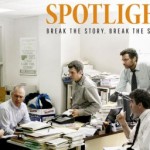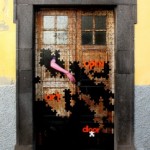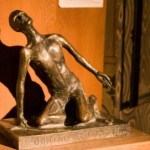In the desert, when the bread of heaven came down upon the fleeing refugees, we are told it was like hoarfrost on the ground. Strangely sweet. A taste of honey in it.
In the mornings people could gather it up in jars, enough to last through the day. Then as now, there were all kinds of folks. And the worriers, the plan-a-headers, the supply counters, and the schemers, the instinctive retailers, the concierges of the caravan, found they could fill a whole lot of jars before the dew was off the ground.
And then they learned manna had a shelf-life of one day. Use before sundown, said the fine print. After that it rots. So the only option was to trust the day, to trust the providing of the day, rather than the anxious demons at work among them, seeking to sway them to fear the day, and all the days to come.
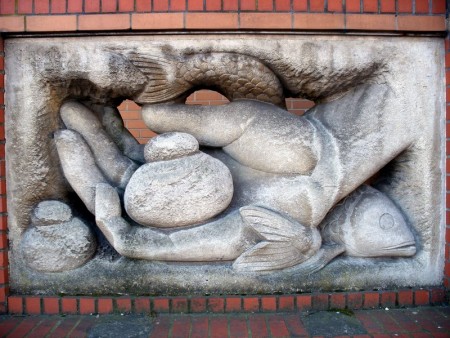 On the mountainside, when Jesus asked Philip, Where shall we buy bread to feed this crowd (five thousand, John tells us), Philip went into an anxiety tail spin: it can’t be done Andrew said, There’s a boy here with five barley loaves and two fish. But it’s not enough. Jesus said, Begin with that.
On the mountainside, when Jesus asked Philip, Where shall we buy bread to feed this crowd (five thousand, John tells us), Philip went into an anxiety tail spin: it can’t be done Andrew said, There’s a boy here with five barley loaves and two fish. But it’s not enough. Jesus said, Begin with that.
At the end, they gathered up the fragments (so that nothing will be lost, Jesus told them) and there was so very much.
It’s much the same here as it was in the wilderness, with the manna: the work is to trust the day, which has already sent a generosity of ears to listen, and along with them, a hunger of mouths to feed. Trust the day, full of wonders, words to remember forever, a sea of faces, and now this, the brink of miracle. Trust the day, and do not let anxiety hold sway, because events really do take planning and this event just happened without any planning. Trust the day, because a small boy is holding out five loaves and two fish, a gesture of love and a sign of amazement, showing us the God who does not hand out plans but does offer us love and signs of amazement.
Who hasn’t given in to the Demon Anxiety? Anxiety is like an old and familiar pair of shoes, pinchingly painful but predictable and secure. Moving ahead while doubting myself, doubting God and certainly Jesus, muttering no good will come of this at each step of my way, seems to be all the faith I can muster, often, seems to be the way I pinch my spirit.
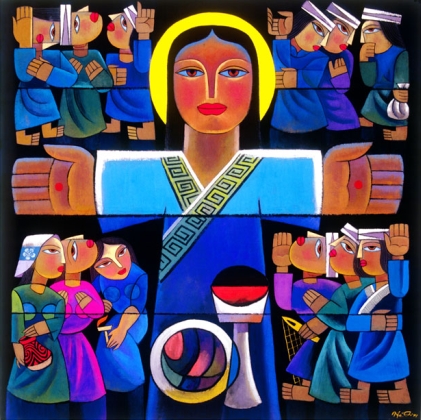 Heaven, Jesus said once, is like a woman who kneads yeast into three barrels of flour, so there will be more than enough. I’ve been in kitchens – church supper kitchens, homeless meals kitchens, my own kitchen, where feasts that produced leftovers that would later engorge refrigerators were being made by cooks who kept up a steady stream of dire predictions. I am still waiting to meet that woman who happily yeasts up three barrels of flour without a single self-flagellating remark that probably the bread won’t rise or the hungry won’t show up.
Heaven, Jesus said once, is like a woman who kneads yeast into three barrels of flour, so there will be more than enough. I’ve been in kitchens – church supper kitchens, homeless meals kitchens, my own kitchen, where feasts that produced leftovers that would later engorge refrigerators were being made by cooks who kept up a steady stream of dire predictions. I am still waiting to meet that woman who happily yeasts up three barrels of flour without a single self-flagellating remark that probably the bread won’t rise or the hungry won’t show up.
Collecting the fragments seems to be a device for showing us the miracle, the abundance, the more-than-enough that, for that day, quelled the anxious Demon in the disciples. Nothing lost is, after all, nothing unnoticed. It is not necessarily something saved. This is, after all, Holy Bread, and it has no shelf life at all. To be eaten immediately, is the rule. Holiness cannot be shelved, nor, I think, can trust be set on a shelf for later use.
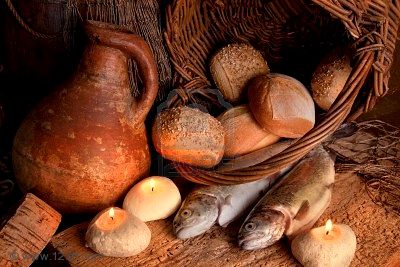 The misreading of John’s words to mean storing up sacred bread for some other time seems to me as foolish as putting manna in jars. What power of Spirit pervades the bread moves into us, we who have straggled in from God-knows-where; we, a collection of fragments of humanity; we, fed to become the Bread that feeds the world. This power of Spirit does not remain behind, in shelved bread, but travels out in us, where it is not lost. Lost is what it would indeed be, if it were possible to shelve it, mete it out, label and date it, or come back later for seconds.
The misreading of John’s words to mean storing up sacred bread for some other time seems to me as foolish as putting manna in jars. What power of Spirit pervades the bread moves into us, we who have straggled in from God-knows-where; we, a collection of fragments of humanity; we, fed to become the Bread that feeds the world. This power of Spirit does not remain behind, in shelved bread, but travels out in us, where it is not lost. Lost is what it would indeed be, if it were possible to shelve it, mete it out, label and date it, or come back later for seconds.
New England churches have long had the tradition of putting any leftover sacramental bread outside, on a bird feeder in the church yard. There it feeds a variety of hungers before sundown, and in the mysterious ways of God, whose bread starter includes small boys and generous women, it is never lost. And in this true mystery, hunger is at last separated from anxiety. Hunger, a natural part of the day, finds itself fed by fragments: fragments of us, fragments of generosity, fragments of goodwill.
___________________________________________________________
Illustrations:
1. Artoklasia Service, Annunciation of the Virgin Mary Greek Orthodox Cathedral, Toronto, 2013. Vanderbilt Divinity School Library, Art in the Christian Tradition.
2. Hand of God With Loaves and Fish, United Reform Church, Brighton, England, late 20thc., Photo by Anders Sandberg. Vanderbilt Divinity School Library, Art in the Christian Tradition.
3. Communion, by He Qi, Nanjing, China. 2001; Vanderbilt Divinity School Library, Art in the Christian Tradition.
4. Loaves and Fish. Vanderbilt Divinity School Library, Art in the Christian Tradition.

